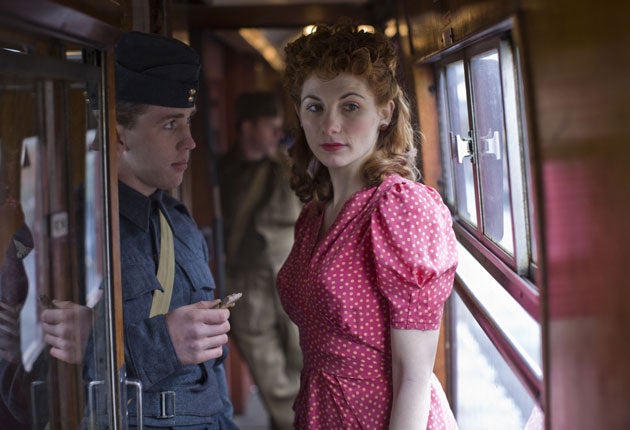The Night Watch, BBC2, Tuesday<br/>Double Lesson, Channel 4, Friday
A Sarah Waters story told backwards is more doom than va-va-voom

Another literary adaptation rolls around, and The Night Watch seems to have all the right ingredients.
Sarah Waters' novels work on television, as the many who enjoyed her lusty lesbian historical romps – such as Tipping the Velvet – will testify. Plus the cast of The Night Watch is a kind of bonnets'n'bustles best of, Claire Foy and Anna Maxwell Martin having both previously taken the lead in Dickens adaptations.
But The Night Watch saw Waters breaking out of the Victorian vein, setting her story in London after and during the Second World War. And yes, in that order: it begins in 1947, jumps back to 1944, and then to 1941, the reverse chronology allowing a slow unspooling of character connections and enjoyable penny-dropping moments. This structure works on screen, and the use of fast rewinds, rattling through scenes in reverse is a neat device.
We track the interweaving lives of four young people, initially meeting Kay (Maxwell Martin) wandering the streets like a ghost, and pretty, wide-eyed Helen (Foy) living with a woman in the first of a knot of bed-hopping relationships. Jodie Whittaker plays Viv, who's having a strangely lacklustre affair with a married man, while Duncan (Harry Treadaway) is a damaged chap – swiftly established as gay by his proffering of a cottage-shaped tea cosy – who's mysteriously been in prison.
Actually, they're all damaged; everyone is in this forlorn, war-torn world. As the 90-minute drama develops, we learn what exactly caused their wounds, but somehow it never feels that gripping. Maybe it's all just too glum: the relationships are tangled and trauma-filled, bringing the violence of war down to a human scale, set against grey streets and claustrophobic interiors. The music, all sawing violins and plonking piano, is also dreary. I'm not hankering for "we had the time of our life eating Spam in a bomb shelter" Blitz spirit, but The Night Watch goes perhaps too far in the other direction. The acting – particularly from the three female leads – is excellent, however; Whittaker and Maxwell Martin can tell you everything you need to know with a twitch of an eyebrow.
We finish with a rather rushed 1947 coda, and sudden new opportunities springing up for them all. Kay's voiceover – used so infrequently it feels like an impertinent intrusion – comments: "Someone once said a happy ending depends on where you decide to stop your story. Then again, it could be when you realise your story is not yet over – you are only at the end of the beginning." Shame, then, that this end feels clumsily stapled on.
Double Lesson makes pretty bleak viewing too. It's part of the First Cut series, which usually showcases documentaries by "up-and-coming" film-makers, although director George Kay here uses testimonies from real teachers to form the backbone of a half-hour fictional monologue. It's delivered straight down the lens by Phil Davis, who plays David, a teacher who lost his temper with a pupil.
It's an unflashy but affecting piece. As it ought, the script rings true, from David's acknowledgement of his very ordinary suburban life – how he and his wife "built an extension and ruined the bathroom ... the sort of things people like us expect to do" – to accounts of his students' constant niggling jibes. These are painfully believable, even when they extend to joking about another teacher's suicide or his wife's breast cancer.
But one thing teachers are definitely not expected to do is lose control and turn on their pupils. Davis's mild-mannered performance begins to crack too – he trembles and twitches as he recounts the blinding effect rage has on his judgement. The film itself apparently sets out "neither to condemn nor condone". But you'd have to have a hard heart not to feel sorry for David – if anyone could use a rewind, it'd be him.
Subscribe to Independent Premium to bookmark this article
Want to bookmark your favourite articles and stories to read or reference later? Start your Independent Premium subscription today.

Join our commenting forum
Join thought-provoking conversations, follow other Independent readers and see their replies